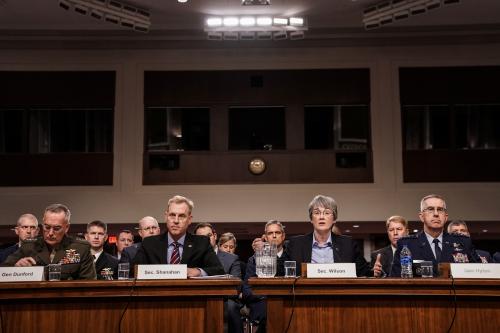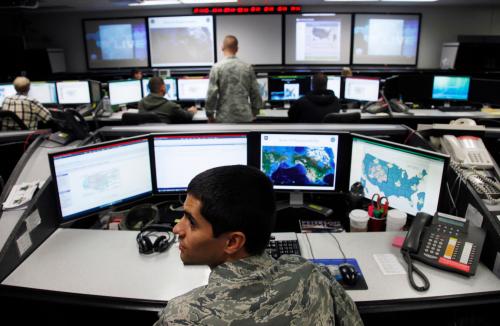In a March speech, Indian Prime Minister Narendra Modi announced that his country had joined an exclusive club. Along with the United States, Russia, and China, India has now successfully tested a destructive anti-satellite weapon against one of its own satellites at around 300 kilometers in outer space. Modi emphasized: “[T]he new capability we have developed is not directed against anyone…This is an effort to secure a fast and growing India.”
Why did India decide to test such a weapon when it did, especially given the negative consequences that debris-generating anti-satellite tests have for the long-term safety and sustainability of the outer space environment? Furthermore, what impact will India’s test have on U.S. policy and the larger international debate over the future of norms of behavior for outer space?
From my perspective, India’s decision to conduct the test was driven by a number of international and domestic political factors. And while the Trump administration’s initial response to the test was confused and uncoordinated, this incident may offer an opportunity for the administration to advance U.S. leadership and strengthen the international norm against debris-generating events in outer space. Is the Trump administration savvy enough to take advantage of the opportunity?
India’s motivations
To close observers of India’s military space program, its latest move is not particularly surprising. The growing militarization of outer space has been a major concern for India since 2007, when China conducted an anti-satellite test against its Fengyun-1C satellite at an altitude of 863 km in outer space. That test created over 3,000 pieces of debris in low-earth orbit, but also demonstrated China’s ability to hold at risk satellites in orbit. Both the United States and the Soviet Union had previously demonstrated such a capability.
In January 2010, the then-head of India’s Defense Research and Development Organization, V.K. Saraswat, made it clear that India would not be left behind in a future space arms race, especially with regard to China. He stated that “India is putting together building blocks of technology that could be used to neutralize satellites,” and that “we are working to ensure space security and protect our satellites. At the same time we are also working on how to deny the enemy access to its space assets.”
In addition to competition with China, two other factors likely contributed to India’s decision to test. First, India probably wanted to ensure it had demonstrated a military capability to destroy a satellite before international prohibitions on testing were put in place. Indeed, Prime Minister Modi specifically said in his March 27 statement that “today’s test does not violate any international law or treaty obligation to which India is a party.” This is largely shaped by India’s experience with nuclear weapons. For example, when India tested a nuclear device in 1974, the Treaty on the Nonproliferation of Nuclear Weapons had already entered into force, and India was thus left outside the club of recognized nuclear powers under the treaty.
Indian domestic politics also contributed. With Modi locked in a competitive re-election campaign, the anti-satellite offered another opportunity to demonstrate to the Indian electorate that under his leadership, India had indeed achieved great-power status.
Pre-Trump U.S.-India engagement on space security
After a history of ups and downs in the relationship, the overall trajectory of the U.S.-India bilateral relationship has been largely positive since the final years of the Clinton administration in the late 1990s. It continued to improve during the George W. Bush administration, especially with the approval of the U.S.-India Civil Cooperation Nuclear Initiative, which provided a framework for developing civil nuclear cooperation while bringing India into closer conformity with international nonproliferation standards and practices. Cooperation on civil space initiatives was also an element of the improving relationship, but space security was not.
This changed in September 2014, when during Prime Minister Modi’s visit to Washington, the United States and India agreed to include space security on the bilateral agenda. The U.S.-India Joint Statement from that visit noted that the United States and India agreed “to start a new dialogue on maintaining long-term security and sustainability of the outer space environment, including space situational awareness and collision avoidance in outer space.” The United States and India subsequently held two meetings of this group during the Obama administration in March 2015 and February 2016 in New Delhi, where they discussed a variety of space security-related issues. The third meeting of the group was held in Washington, DC on March 13, 2019, where, according to a joint statement, the two sides “discussed trends in space threats, respective national space priorities, and opportunities for cooperation bilaterally and in multilateral fora.”
The Trump administration’s botched initial response
The Trump administration’s initial response to the Indian anti-satellite test was totally uncoordinated. In response to questions from the press, a State Department spokesperson stated that “the issue of space debris is an important concern for the U.S. government. We took note of Indian government statements that the test was designed to address the debris issues.” And the spokesperson went on to say that the United States would continue “to pursue shared interest in space and scientific and technical cooperation, including collaboration and safety and security in space.”
NASA Administrator James Bridenstine was much less diplomatic. In remarks at a NASA townhall meeting, Bridenstine said that it is a
terrible, terrible thing to create an event that sends debris at an apogee that goes above the International Space Station…That kind of activity is not compatible with the future of human spaceflight that we need to see happen…It is not acceptable for us to allow people to create debris fields that put at risk our people.
On March 29, NASA reportedly suspended cooperation with the Indian Space Research Organization (ISRO) on human spaceflight cooperation, stating: “It is NASA’s view that human space flight is incompatible with the purposeful creation of orbital debris generated by anti-satellite testing.” However, the suspension of human spaceflight cooperation was reversed a week later at the direction of the White House.
The Trump administration, like previous administrations, rightly views India as a critical strategic partner. So it is understandable why, for political reasons, it was reluctant to publicly criticize India’s test, especially given the steps India took to minimize long-lived debris. I am sympathetic to these concerns. As I’ve written elsewhere, “In an era of great power competition, cooperation between the world’s two largest democracies [the United States and India] must be a strategic imperative. And cooperation in outer space should be a key element of that partnership.” That said, I hope the Trump administration is sending strong private messages to New Delhi that additional debris-generating anti-satellite tests are totally inconsistent with maintaining the long-term security and safety of the space environment.
A potential diplomatic opening for the Trump administration?
As I’ve noted elsewhere, the Trump administration deserves credit for focusing public attention on the emerging threat to U.S. and allied space systems from Russia and China. Though I remain unconvinced that establishing the Space Force is the right solution, I believe many of administration’s other space security proposals—such as re-establishing U.S. Space Command and transferring the space traffic management mission from the Department of Defense to a civilian agency—deserve bipartisan support.
However, one gaping hole in the Trump administration’s largely sound approach to space security has been its utter lack of diplomacy. Senior-level administration officials, including National Space Council Executive Secretary Scott Pace and Secretary of the Air Force Heather Wilson, have expressed public support for establishing norms of behavior for outer space. However, the Trump administration has yet to advocate for any particular diplomatic initiative other than the U.N. Committee of Peaceful Uses of Outer Space’s effort to develop long-term sustainability guidelines, which had begun during the Obama administration. That said, could India’s anti-satellite test provide an opportunity for the Trump administration to show leadership on space diplomacy?
General John Hyten, the current commander of the U.S. Strategic Command who was recently nominated to become the next vice chairman of the Joint Chiefs of Staff, appears to think so. Responding to a question about the Indian anti-satellite test during a April 2019 interview, Hyten noted that while he appreciated the way that India structured its test “in very low earth orbit, and did not create significant debris that put things at risk…Nonetheless, all debris is bad, and I hope for the day when we have norms of behavior, and I think the place to start is with debris-creating events. I think that’s the perfect place to start.”
Diplomatic options for the Trump administration
If the Trump administration wanted to develop a diplomatic initiative to enhance the norm against debris-generating events in space, how might it accomplish this goal? There are a number of options that it could pursue.
- Unilateral moratorium. The simplest option would be for the United States to declare a unilateral moratorium on debris-generating tests of anti-satellite weapons. Under such an approach, the United States would announce it would refrain from conducting debris-generating anti-satellite tests as long as other states refrained from further tests. As part of this announcement, the United States could encourage other states to make similar unilateral pledges.
- Bilateral joint political statements. Another option could be to develop bilateral agreements or statements with other major space-faring nations like China, Russia, and India. Under this approach, the United States and another party (e.g., India or China) would release a bilateral pledge not to conduct debris-generating anti-satellite tests as long as other nations refrained from testing.
- Multilateral diplomatic approaches. Though the Trump administration is generally reluctant to engage in multilateral diplomacy, there are a number of non-legally binding, multilateral actions it could take to strengthen the norm against debris generating tests. For example, it could coordinate a statement by the five permanent members of the U.N. Security Council, negotiate a statement by the Group of 20, sponsor a resolution in the U.N. General Assembly, or work the issue through other U.N.-related forums like the U.N. Disarmament Commission or the Committee on the Peaceful Uses of Outer Space.
- Legally-binding treaty or agreement. Finally, the Trump administration could propose negotiating a legally-binding treaty that would prohibit debris generating anti-satellite tests in outer space. While it’s unlikely that the Trump administration would take such an approach, and there are significant challenges that would need to be worked through like verification, a number of experts have advanced proposals for what such a treaty might look like.
While the Trump administration tends to be critical of multilateral diplomatic initiatives, there are a number of practical options available that would allow it to demonstrate international leadership on the space debris issue in a way that wouldn’t necessarily constrain future options. However, it’s highly questionable that the United States would ever want to conduct further debris-generating anti-satellite tests, given the negative impact that such events could have on the sustainability and safety of the outer space environment.
Will the Trump administration seize the moment?
The Trump administration’s initial reaction to India’s anti-satellite test was confused and uncoordinated. Its decision not to condemn the test more forcefully was probably driven by the perceived need to maintain India as a strategic partner, and by the fact that India conducted the test in a way that minimized the creation long-lived debris in orbit. However, the statements by NASA Administrator Bridenstine and General Hyten highlight the fact that further debris-generating events in outer space are not in the interests of the United States.
The key question now is whether the Trump administration will use India’s anti-satellite test as an opportunity to advance the development of norms of behavior for outer space, something that senior-level Trump administration have indicated they are open to. If it does, there are a number of flexible diplomatic options it could pursue. However, will the Trump administration take advantage of this window of opportunity?
The Brookings Institution is committed to quality, independence, and impact.
We are supported by a diverse array of funders. In line with our values and policies, each Brookings publication represents the sole views of its author(s).










Commentary
India’s anti-satellite test presents a window of opportunity for the Trump administration
Will it take advantage?
May 10, 2019